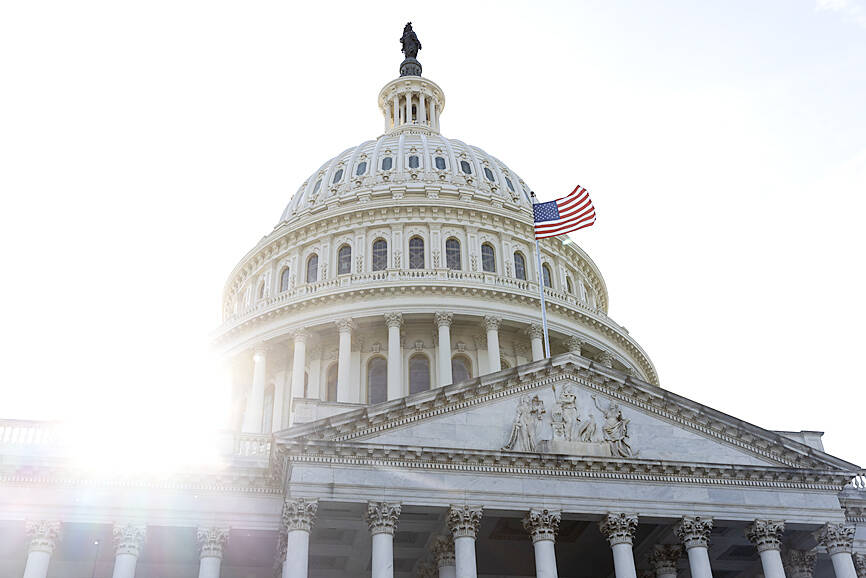The US Senate Committee on Foreign Relations on Thursday approved a bill mandating the US Department of State to review and update its policy guidance on Taiwan every five years due to the ever-changing geopolitical situation and growing risk of a Chinese invasion.
The Taiwan assurance implementation act was introduced by Republican US Senator John Cornyn and Democrat US Senator Chris Coons on March 3.
The US House of Representatives in 2023 overwhelmingly passed a bill of the same name, which authorized the US secretary of state to review the guidelines on exchanges with Taiwan and submit a report to the US Congress every two years.

Photo: EPA-EFE
The version proposed by Cornyn and Coons includes more detailed provisions, such as amending the Taiwan Assurance Act of 2020, regularly reviewing the “Guidelines on Relations with Taiwan” and related documents, and reissuing guidance to executive branch departments and agencies.
After completing its review, the state department must submit a report to both the US Senate Committee on Foreign Relations and the US House Committee on Foreign Affairs within 90 days.
“Our commitment to Taiwan must be backed by an approach that evolves with the changing realities in the Indo-Pacific,” Coons said in a statement issued earlier this month.
Meanwhile, Cornyn said the legislation would help reinstate a strong Taiwan strategy at the state department.
“The threat China poses to the stability of the Indo-Pacific, including our friend and ally Taiwan, is ever-evolving, and our diplomatic guidance must be able to keep up,” he said.
The bill must be passed by both the Senate and the House of Representatives before it is signed into law by the US president.
A bipartisan group of House lawmakers introduced a counterpart bill late last month, but the voting schedule has not yet been announced.

SECURITY: As China is ‘reshaping’ Hong Kong’s population, Taiwan must raise the eligibility threshold for applications from Hong Kongers, Chiu Chui-cheng said When Hong Kong and Macau citizens apply for residency in Taiwan, it would be under a new category that includes a “national security observation period,” Mainland Affairs Council (MAC) Minister Chiu Chui-cheng (邱垂正) said yesterday. President William Lai (賴清德) on March 13 announced 17 strategies to counter China’s aggression toward Taiwan, including incorporating national security considerations into the review process for residency applications from Hong Kong and Macau citizens. The situation in Hong Kong is constantly changing, Chiu said to media yesterday on the sidelines of the Taipei Technology Run hosted by the Taipei Neihu Technology Park Development Association. With

A US Marine Corps regiment equipped with Naval Strike Missiles (NSM) is set to participate in the upcoming Balikatan 25 exercise in the Luzon Strait, marking the system’s first-ever deployment in the Philippines. US and Philippine officials have separately confirmed that the Navy Marine Expeditionary Ship Interdiction System (NMESIS) — the mobile launch platform for the Naval Strike Missile — would take part in the joint exercise. The missiles are being deployed to “a strategic first island chain chokepoint” in the waters between Taiwan proper and the Philippines, US-based Naval News reported. “The Luzon Strait and Bashi Channel represent a critical access

‘FORM OF PROTEST’: The German Institute Taipei said it was ‘shocked’ to see Nazi symbolism used in connection with political aims as it condemned the incident Sung Chien-liang (宋建樑), who led efforts to recall Democratic Progressive Party (DPP) Legislator Lee Kun-cheng (李坤城), was released on bail of NT$80,000 yesterday amid an outcry over a Nazi armband he wore to questioning the night before. Sung arrived at the New Taipei City District Prosecutors’ Office for questioning in a recall petition forgery case on Tuesday night wearing a red armband bearing a swastika, carrying a copy of Adolf Hitler’s Mein Kampf and giving a Nazi salute. Sung left the building at 1:15am without the armband and apparently covering the book with a coat. This is a serious international scandal and Chinese

COUNTERINTELLIGENCE TRAINING: The ministry said 87.5 percent of the apprehended Chinese agents were reported by service members they tried to lure into becoming spies Taiwanese organized crime, illegal money lenders, temples and civic groups are complicit in Beijing’s infiltration of the armed forces, the Ministry of National Defense (MND) said in a report yesterday. Retired service members who had been turned to Beijing’s cause mainly relied on those channels to infiltrate the Taiwanese military, according to the report to be submitted to lawmakers ahead of tomorrow’s hearing on Chinese espionage in the military. Chinese intelligence typically used blackmail, Internet-based communications, bribery or debts to loan sharks to leverage active service personnel to do its bidding, it said. China’s main goals are to collect intelligence, and develop a